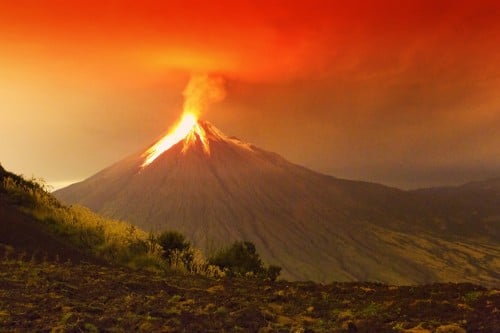Many small volcanic eruptions have helped curb climate change over the past ten years

Last Valentine's Day, in February 2014, the Kelud volcano in Indonesia erupted, lost its summit and covered in ash villages within a radius of up to 500 kilometers from it. At the same time, the eruption sent sulfur dioxide into the stratosphere, to a height of 28 kilometers above sea level. The amount was small, but its consequences were important because the compound created tiny drops of sulfuric acid that scattered sunlight and helped cool the Earth. "Small" eruptions like this one, and like 17 others that happened between 2000 and 2012 in all kinds of places in the world, including Manam, Mountains Superior, Jebel A-Tier, and Eifeltlaikotel, helped slow down global warming. This is according to a study published in the journal Nature Geoscience.
"The surge in volcanic activity at the beginning of the 21st century undoubtedly contributed to the lull [in warming]," says atmospheric researcher Benjamin Santer of the Lawrence Livermore National Laboratory, lead author of the paper. But the volcanoes weren't the only factor. The sun, which was particularly quiet, the air pollution from China's coal-fired power plants [which release light-scattering particles - the editors], and the mysterious actions of the oceans did their part. And Santer adds: "All in all, the result was a partial offset of the action of the greenhouse gases emitted due to human actions."
Meanwhile, global warming continues to gather strength while hidden behind volcanoes whose summits could explode at any moment. According to studies conducted on past giant eruptions, such as that of Mount Pinatubo in the Philippines in 1991, it is expected that the light-reflecting droplets and particles (aerosols) will fall to the ground within a few years, leaving the earth exposed to the full force of the action of the heat-trapping greenhouse gases that humans emit.
If the volcanoes don't contribute their share, we may have no choice but to spread our own aerosols. Advocates of this example of "geo-engineering" want to intervene by injecting sulfuric aerosols into the stratosphere instead of or in addition to those that are dispersed by volcanic eruptions. Such deliberate modification of global climate systems has been proposed as an emergency plan in case climate change becomes catastrophic. However, this would come at the expense of the health of the stratosphere, the layer that helps protect life from ultraviolet radiation, because the sulfuric acid in the sky has an unwanted side effect of ozone depletion. But given the stalemate in reducing greenhouse gas pollution, the geoengineering debate is sure to continue even after the effects of recent small volcanic eruptions wear off.
The article was published with the permission of Scientific American Israel

3 תגובות
You don't know the difference between the short term and the long term. Obviously there is an offset and it would be good if only gases that cause cooling were emitted. In the long term, the volcanoes also contribute their part, but it is usually negligible compared to the human influence.
And I personally like the fact that the CO2 that is emitted in unimaginable quantities from any such eruption suddenly does not contribute to warming but to cooling...indeed the climate scientists have accurate and scientific models. (sarcasm).
Pay attention - one small volcano that erupted cooled the atmosphere and affected more than all the human activity that was supposed to warm the atmosphere! Are we not exaggerating the human contribution to global warming?
Just food for thought.
Yehuda